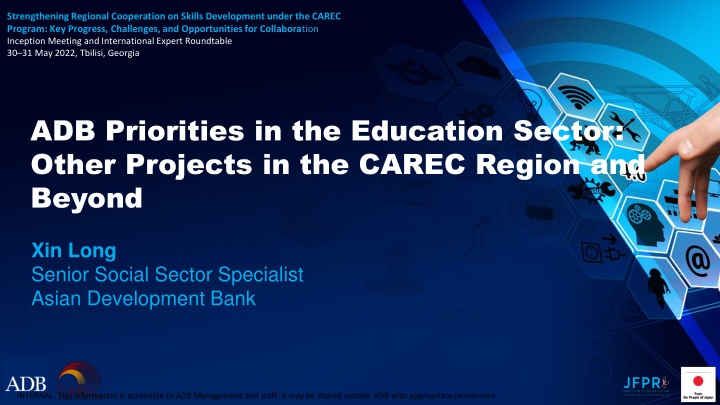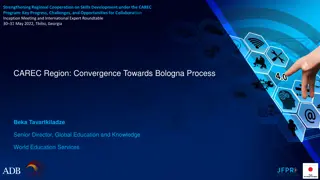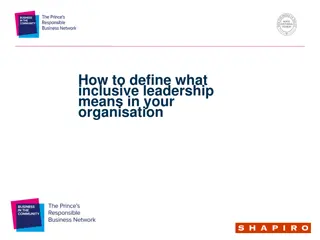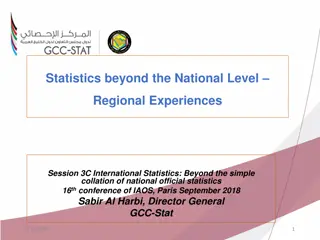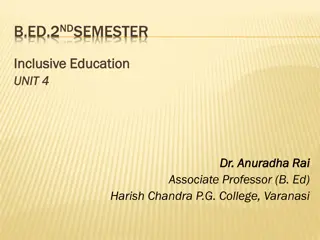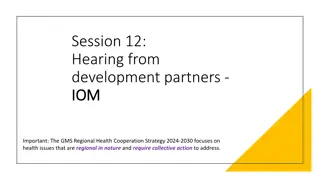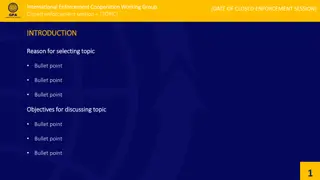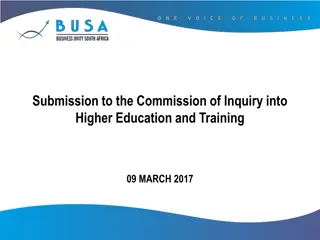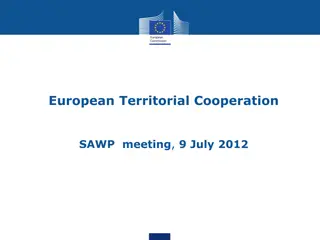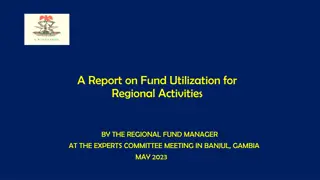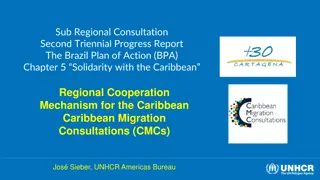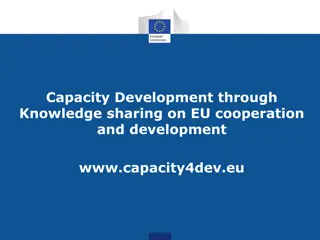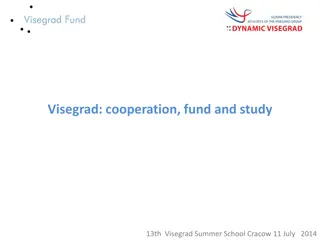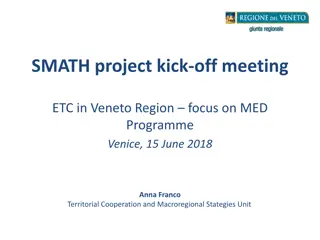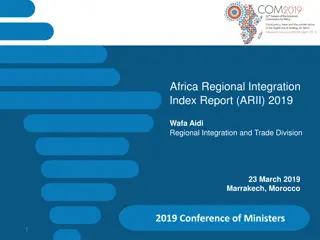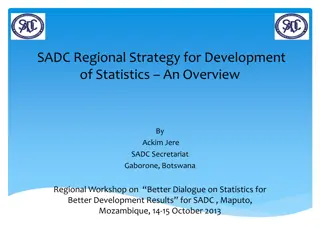Enhancing Regional Cooperation in Skills Development for Inclusive Growth
Strengthening regional cooperation on skills development in the CAREC program is crucial for addressing poverty, reducing inequalities, and promoting gender equality. Key progress, challenges, and opportunities for collaboration were discussed at the inception meeting in Tbilisi, Georgia. The ADB's priorities in the education sector, along with relevant skills analysis and forthcoming skills, highlight the need for capacity building, labor market monitoring, and inclusiveness initiatives to bridge skills gaps and promote sustainable development in the region.
Download Presentation

Please find below an Image/Link to download the presentation.
The content on the website is provided AS IS for your information and personal use only. It may not be sold, licensed, or shared on other websites without obtaining consent from the author.If you encounter any issues during the download, it is possible that the publisher has removed the file from their server.
You are allowed to download the files provided on this website for personal or commercial use, subject to the condition that they are used lawfully. All files are the property of their respective owners.
The content on the website is provided AS IS for your information and personal use only. It may not be sold, licensed, or shared on other websites without obtaining consent from the author.
E N D
Presentation Transcript
Strengthening Regional Cooperation on Skills Development under the CAREC Program: Key Progress, Challenges, and Opportunities for Collaboration Inception Meeting and International Expert Roundtable 30 31 May 2022, Tbilisi, Georgia ADB Priorities in the Education Sector: Other Projects in the CAREC Region and Beyond Xin Long Senior Social Sector Specialist Asian Development Bank INTERNAL. This information is accessible to ADB Management and staff. It may be shared outside ADB with appropriate permission.
Strategic Alignment ADB Strategy 2030 OP1: Addressing remaining poverty and reducing inequalities 1.1 Improved education services 1.2 Job generated OP2: Gender equality and women s empowerment 2.1 Skilled jobs for women created 2.2 Women and girls completing secondary and tertiary education, and/or other training OP3: Tackling climate change and disaster resilience OP5: Rural development and food security 5.1 Increased rural investment (education services improved in rural areas) OP6: Strengthening governance and institutional capacity OP7: Regional cooperation and integration 7.3 Regional public goods (improve regional education services) Country Partnership Strategies Economic diversification Human capital development INTERNAL. This information is accessible to ADB Management and staff. It may be shared outside ADB with appropriate permission.
Relevant Skills and Forthcoming Skills Skills gap analysis: Many countries started labor market monitoring and assessment Skills gap analysis needs capacity strengthening Results for guiding the planning for skills development Dynamic labor market monitoring and reporting is needed Industry 4.0 ADB RETA for selected countries (AZB, PAK, UZB) in selected trades (construction, textiles, agriculture, IT) Regional cooperation for developing advanced skills for catching up with the advanced skills need INTERNAL. This information is accessible to ADB Management and staff. It may be shared outside ADB with appropriate permission.
Inclusiveness Gender Labor force participation (F lower than M) Gender bias in selecting training, tertiary education, and career (traditional VS non-traditional) Constraints for women to join labor market (e.g. lack of preschool education for young children, lack of flexible jobs allowing work from home) Vulnerable people Poor people, people with disabilities, etc. Climate change and disaster resilience Renewable energy, energy saving facilities, disaster resilient buildings Identify population vulnerable to climate change and disaster INTERNAL. This information is accessible to ADB Management and staff. It may be shared outside ADB with appropriate permission.
Focus Areas related to RETA Labor market: capacity building on monitoring, analysis and reporting, skills gap survey and assessment, employment service, LMIS, migration service Skills development: skilling and reskilling, collaboration with industries and private sector, competency-based training, assessment, teacher development, entrepreneurship and soft skills, international institutional cooperation, industry 4.0 Tertiary education: Pre-service teacher development (STEM), linking (STEM) knowledges to real world solutions, linkage with general education Education technology: e-learning platform, EMIS, teacher capacity building in using edu tech. INTERNAL. This information is accessible to ADB Management and staff. It may be shared outside ADB with appropriate permission.
Operations in Education Sector (1) CAREC Countries (covered by CWSS) Current Education Sector Operations Components Period Afghanistan Sustaining Essential Services Delivery Project (Support for Afghan People) Food security enhanced; Delivery of core health services continued; Access to primary and secondary education sustained; Monitoring and implementation capacity strengthened 2022-2023 Azerbaijan Modernizing Vocational Education and Training for Economic Diversification Sector Development Program Planned for approval in 2023 Georgia Modern Skills for Better Jobs Sector Development Program Quality and relevance of VET in priority economic sectors improved; Access to, and inclusiveness of, VET system increased; Institutional framework strengthened through increased private participation in VET. 2020-2026 Kyrgyz Republic School Reform Sector Development Program Planned for approval in 2022 INTERNAL. This information is accessible to ADB Management and staff. It may be shared outside ADB with appropriate permission.
Operations in Education Sector (2) CAREC Countries (covered by CWSS) Current Education Sector Operations Components Period Pakistan Sindh Secondary Education Improvement Project Integrated Social Protection Development Program New secondary school blocks constructed, and operated under EMO (education management organizations) program; Teaching capacity in five key subjects (English, mathematics, biology, chemistry, and physics) improved; Secondary education examination system strengthened. Institutional capacity for social protection and climate resilience strengthened; Access to primary and secondary education improved for children and adolescents of poor families; Access to health services and nutrition supplies enhanced for women, adolescent girls, and children of poor families. 2020-2025 2022-2025 Punjab Skills Development Project Planned for approval in 2023 INTERNAL. This information is accessible to ADB Management and staff. It may be shared outside ADB with appropriate permission.
Operations in Education Sector (3) CAREC Countries (covered by CWSS) Tajikistan Current Education Sector Operations Strengthening TVET Project Components Period TVET system methodology modernized; Physical learning facilities upgraded; Access to quality programs improved; Governance and management strengthened. More inclusive and targeted migration support provided; Access to and relevance of public employment services enhanced; Planning and management of migration and employment services strengthened. 2015-2022 (completed) Skills for Employability Enhancement Project 2020-2025 Improving STEM Secondary Education Project Planned for approval in 2023 Uzbekistan Skills Development for a Modern Economy Project Employment and workforce development services improved; Quality and relevance of skills development enhanced; Sector governance and management strengthened. 2021-2026 Strengthening STEM in Secondary Education Project Planned for approval in 2023 INTERNAL. This information is accessible to ADB Management and staff. It may be shared outside ADB with appropriate permission.
Proposed Areas for Regional Cooperation Labor market assessment and capacity building Competency standards for occupations Teacher development Assessment and certification Centers of excellence in skills development Industry 4.0 E-learning programs Migration services INTERNAL. This information is accessible to ADB Management and staff. It may be shared outside ADB with appropriate permission.
Proposed Areas for Regional Cooperation Thank you! INTERNAL. This information is accessible to ADB Management and staff. It may be shared outside ADB with appropriate permission.
